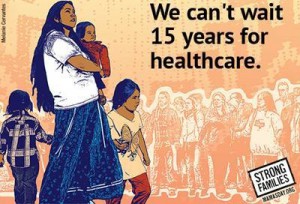Latinas rally across the country for health care for immigrant women: Latinas and their families know #15years is too long to wait
This week, the National Latina Institute for Reproductive Health (NLIRH) launches its fourth annual Latina Week of Action for Reproductive Justice. With the support of more than 85 organizations, including the partnership of California Latinas for Reproductive Justice (CLRJ) and the Colorado Organization for Latina Opportunity and Reproductive Rights (COLOR), NLIRH’s activists will rally across the country to let our policymakers know that #15years is too long for women and families to wait for health care.
As the nation moves forward on immigration reform, working to create a path to citizenship for the nation’s 11 million aspiring citizens, the health care needs of immigrant women and children have been left behind. Today, many immigrant women and children have no health care, and current proposals do little to make the situation better. Under the immigration bill that just passed the Senate, many families would be forced to wait 15 years or longer before seeing a doctor.
Latinas are hosting town halls, conversations with policymakers, meetings of community members and more in New York, Miami, Atlanta, Los Angeles, Columbia, S.C., Houston and other cities across Texas. Across the country, many more Latinas and supporters are joining the effort by signing the online petition calling for immigration reform that includes health care for aspiring citizens and their families, submitting a photo holding a #15years is Too Long to Wait sign, and gathering community members to hold lawmakers accountable for humane immigration reform that respects women and families.
“For a Latina with undiagnosed breast or cervical cancer, waiting 15 years to get medical care could be the difference between life and death,” said Jessica González-Rojas, executive director of NLIRH. “As we continue to advance a pathway to citizenship, we must not forget access to much-needed and life-saving health care for immigrant women and their families.”
This is a critical moment for women immigrants and their families. Women immigrants and their families continue to be marginalized in the national debate about comprehensive immigration reform. Immigrant women are key contributors to the success of the U.S. economy, yet current proposals would force many of these women — the backbones of their communities and often breadwinners of their families — to wait a decade and a half for health care.
“We must call on lawmakers to listen to immigrant women and families, so that reform allows aspiring citizens the opportunity to fully contribute to our families, communities, and economy,” said González-Rojas. “Latinas have demanded immigration reform that respects human dignity and supports the health and success of our communities. Congress should deliver nothing less.”
More than 85 organizational co-sponsors have joined Week of Action, which is planning 31 actions and events in 16 cities. Click here for more information on the national Latina Week of Action for Reproductive Justice, and events taking place nationwide.


The views and opinions expressed in this post are those of the author(s) and do not necessarily reflect those of MomsRising.org.
MomsRising.org strongly encourages our readers to post comments in response to blog posts. We value diversity of opinions and perspectives. Our goals for this space are to be educational, thought-provoking, and respectful. So we actively moderate comments and we reserve the right to edit or remove comments that undermine these goals. Thanks!